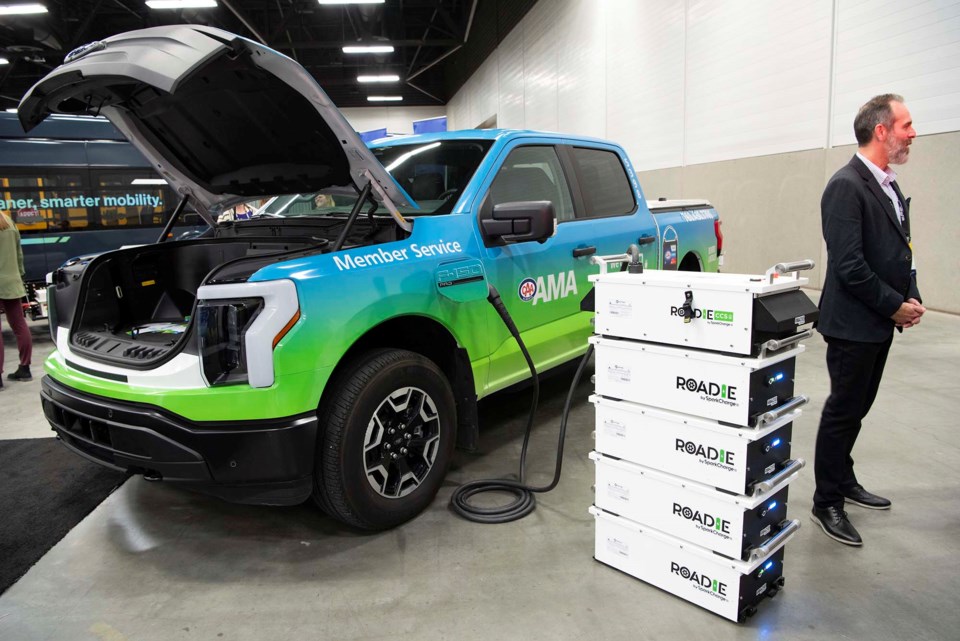Some St. Albert-area drivers say the province’s proposed new electric vehicle tax is an unfair tax on clean air.
Alberta Finance Minister Nate Horner tabled the 2024 provincial budget Feb. 29. It includes a proposed $200 annual tax on electric vehicles (EVs) that will kick in Jan. 1, 2025, and be in addition to the annual fees drivers pay to register their vehicles.
“EVs tend to be heavier than similar internal combustion vehicles and cause more wear and tear on provincial roadways while their owners pay no fuel tax,” budget documents read, adding that there are “fairness” concerns as a result.
The budget states the proposed $200 tax is “in line” with the estimated amount of fuel tax paid by most internal combustion vehicle owners. The tax would bring in about $1 million in 2024-25, rising to $5 million the year after. The fee will cost $3 million to implement, and will not apply to hybrid vehicles.
About 0.26 per cent of all vehicles registered in Alberta were electric as of 2023, the province reports.
St. Albert classic car collector Art Rutledge, who owns three EVs, said the province’s justification for this new EV tax didn’t pass the smell test, as the weights of many EVs were actually very close to their gas-powered counterparts. Car and Driver reports a 2024 electric Nissan Leaf weighs about 1,592 kg, for example, compared to the 1,622 kg gas-powered 2024 Toyota Camry TRD V6.
“The weight thing is just frankly a political boondoggle,” Rutledge said.
Rutledge also questioned the exemption for hybrids, noting that his plug-in hybrid BMW i3 burned just 7 L of gas last year.
“Is it equitable to exempt that one?”
St. Albert resident Harry Wagensveld, who drives a Tesla Model Y, questioned how far you’d have to drive to pay $200 worth of fuel tax.
“I don’t drive that much, and I don’t agree that [my car] is that much heavier than a [gas-powered] car.”
Assuming 13 cents a litre of fuel tax (the rate that would apply under the provincial budget’s projected oil price of $74 per barrel), the driver of a 2024 Ford F-150 pickup truck (which burns 11.3L/100 km, reports Natural Resources Canada) would pay $200 of fuel tax after about 13,615 km. A 2024 Honda Civic sedan driver (6.9 L/100 km) would pay that much after about 22,297 km.
William York, a director with the Electric Vehicle Association of Alberta, said Alberta is throwing up roadblocks to EV ownership at a time when B.C. and other governments are incentivizing it. He called the proposed tax a “clean air tax” as it only applies to vehicles that do not release air pollution from their tailpipes.
“When [the provincial government] talks about fairness and the destruction of roads, I’d like them to also consider the destruction to our lungs and our health,” he said.
York questioned the argument that not paying fuel tax meant not paying for roads, as Alberta’s fuel tax was not specifically linked to roads (it goes into general revenue). He also noted the proposed tax charges all EV drivers the same amount, meaning someone who drives a heavy car 50,000 km pays the same penalty as one who drives a light one 50 km. The fuel tax, in contrast, is based on fuel use, and rewards those who drive less or own efficient cars.
Another way to tax
In an October 2021 commentary for Nature, University of Calgary economist Blake Shaffer said EV weight was part of an overall trend since the 1990s toward heavier vehicles that was causing more road wear and traffic deaths. He called on governments to offset lost gas tax revenue by charging owners based on vehicle weight and/or distance travelled, as some US states were doing. Doing so would also reduce pollution from manufacturing and encourage people to drive less.
Wagensveld said this new EV tax would be annoying, but would be offset by the tremendous savings on gas from driving electric. He wasn’t sure if it would discourage people from getting EVs.
“As of 2035, you won’t have a choice anymore,” he added, referring to the federal government’s goal to require all new light-duty vehicles sold in Canada after 2035 to be zero-emission ones.
The province will table legislation to implement the EV tax this fall.




